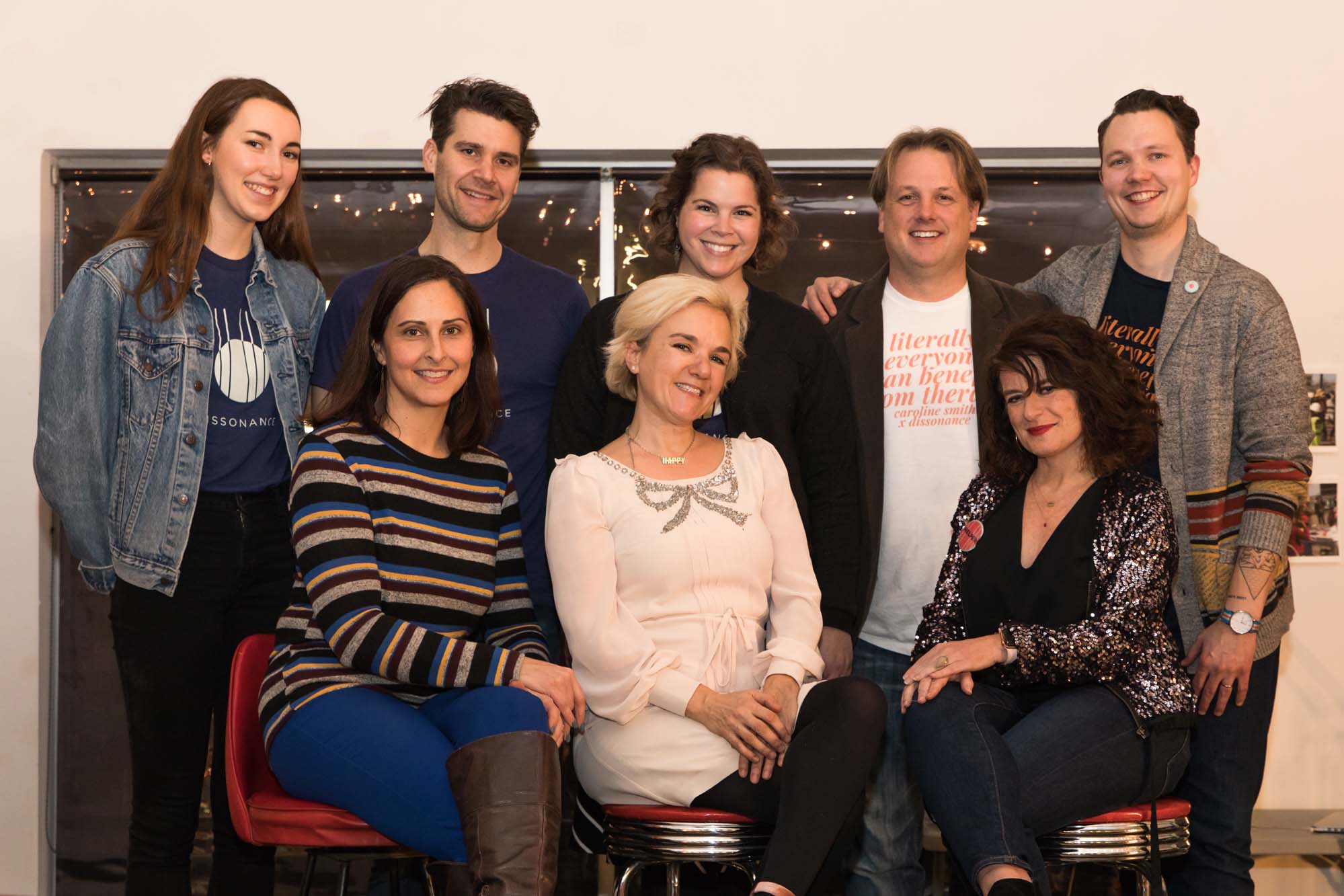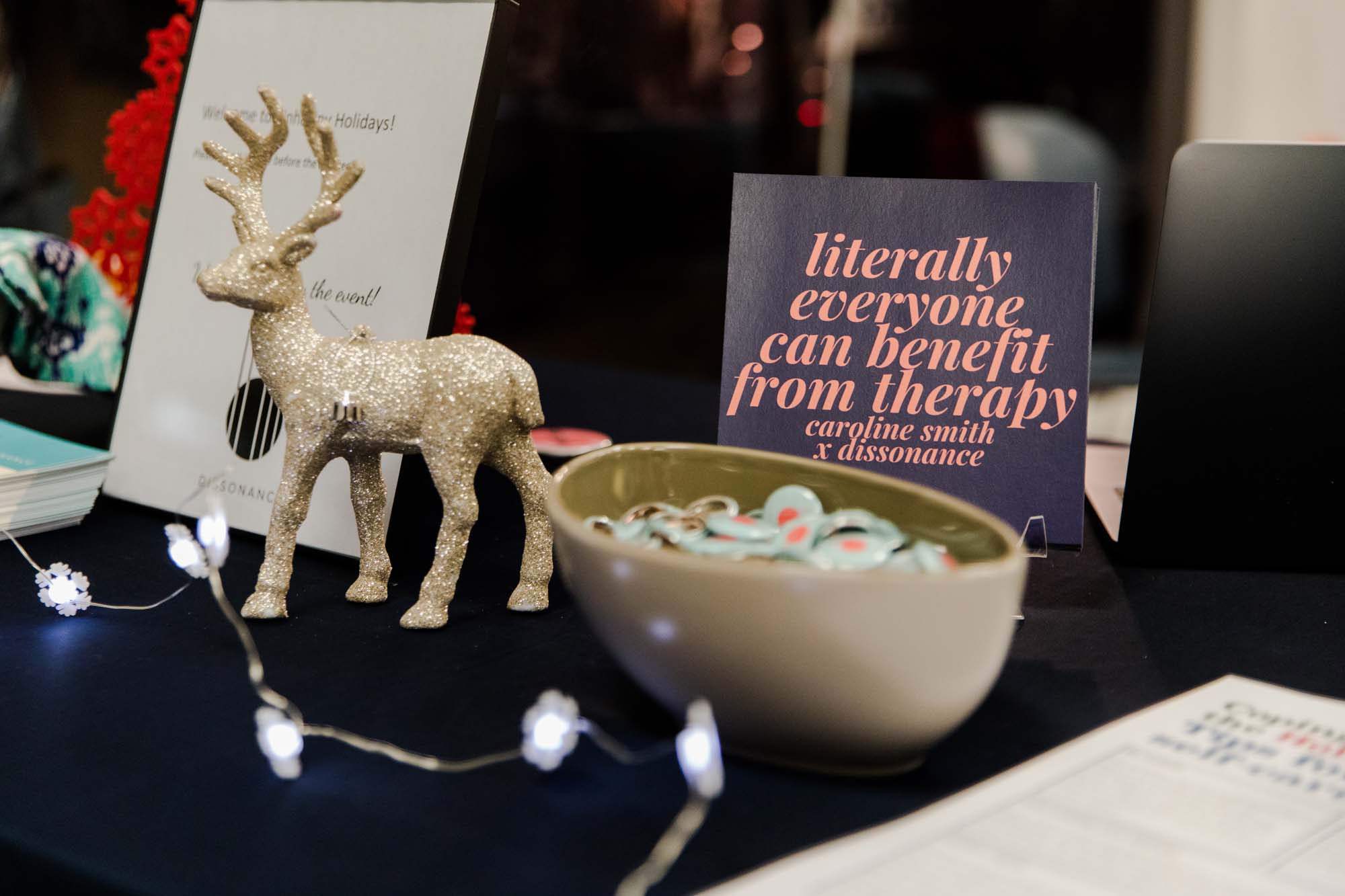By Jen Gilhoi
Dissonance’s third annual Unhappy Holidays event on Dec. 20 seemed to perfectly coincide with the very necessary need to hit the holiday-stress pause button. It came at a time when people were facing lengthy to-do lists and last-minute deadlines before the holiday break. It came at time when anticipation, anxiety and maybe even depressive thoughts were on the rise. It came when a pause was needed.
Dissonance’s alternative holiday gathering once again brought people together without alcohol, other substances or any of the season’s typical expectations. The evening kicked off with “Christmas Wish,” a song created and performed by Katy Vernon, Dissonance board member and ukulele songbird, a singer of sad songs on a happy instrument. The song is about missing loved ones during the holidays and was inspired by Katy’s work with Dissonance and reflections on the first Christmas her 12 year-old self spent without her mom, who had passed. The lilt of the ukulele hinted at happy, with grief and loss woven between, capturing the Dissonance vibe to a T.
Dissonance co-founder Sarah Souder Johnson welcomed everyone and walked through a breathing exercise to bring us into the present. Carl Atiya-Swanson, outgoing Dissonance board member, then took the stage as emcee to start the conversation with panelists about their art, the dissonance they experience in their lives and how they stay well (#howdoyoustaywell).
Comedian Brandi Brown—co-host of the podcast, “Bill Corbett’s Funhouse;” frequent blogger; and much more—covered topics from blackness, therapy and the St. Paul-Minneapolis rivalry to being Minnesotan on the East Coast. With her no-nonsense wit, Brandi shared one of her strategies for managing time, stress and her attention-deficit disorder: “Say no; saying no saves a lot of lives.” She also highly recommended therapy, and not just because it’s “a free workshop for jokes.”
Award-winning writer, community leader and activist Saymoukda Duangphouxay Vongsay grew up in St. Paul as a refugee from Laos. Her story is certainly no joke. But she has a wit of her own, and there is a childlike lightness in her beautifully illustrated book, When Everything Was Everything. The audience listened intently as Saymoukda and her publisher read from the book on stage and shared vivid imagery of everything from bowl haircuts to hand-me-down jeans, worn while working in cucumber fields. The book represents a poetic slice of her life, hinting at the residual optimism she may have inherited from her mother.
Throughout the evening, artists shared their views and experiences with self-care and wellbeing, discussing not-so-easy-to-accept truths about their health and the actionable practices that help them. Musician Chris Tait, founder of Passenger Recovery, a Detroit-based nonprofit that helps touring musicians and travelers find support away from home, shared a story of a Saskatoon gig that shed clear light on the need for support, safe spaces and community while on the road.
Wellbeing for Chris, keyboardist for indie rock vets Electric Six, starts with self-awareness about the nature of his life as an artist and the reality of his life in recovery from addiction. For example, while it’s easy to inwardly focus in a creative songwriting zone, Chris says he’s acutely aware of the need to balance that with plenty of time spent outside of his own headspace, focused on others. Chris shared two songs—Oh Severed Head and Jonathan Turtle—that provided humorous food-for-thought, punctuated by surprising kazoo and whistling solos.
Lydia Liza shared her journey from a 16-year-old prodigy thrust early into an adult career to the 24-year-old woman today that is excelling musically and personally, after giving up alcohol and working on co-dependency issues. With her song I Just Want To Know You More, she sang about being in a relationship or space because you think it’s safe, rather than because it’s fulfilling or benefiting anyone. Heck yeah, she’s in recovery now and living her daily “citizen-life” while being creative. Of the challenges balancing health and work in the music business, she said: if you love your creative being enough, you will find the balance.
Will she find that balance on Twitter? Maybe not. Lydia touched on her 2016 remake of the holiday standard, Baby It’s Cold Outside, with Josiah Lemanski—a recording that went viral, gaining national attention for its message about the importance of consent in relationships. Proceeds from the song all go to The Sexual Violence Center of Minnesota; the National Alliance to End Sexual Violence; and the Rape, Abuse and Incest National Network, meaning the “trolls” on Twitter who blast the song as political-correctness-run-amok only support her cause by continuing to bring attention to it with their personal attacks. With that in mind,, Lydia said she has had some fun taking on the Twitter trolls but acknowledged that it all wears on her a bit. Brandi used her phone to pull up @lydializamusic on Twitter and handed the phone to Lydia so she could share some of the comments and her responses. Lydia said she enjoys the opportunity to be sassy, put the trolls in their place, and bring more attention to her cause but added that, for her own health and wellbeing, it’s best to put limits on her engagement.
We ended on a high note of acceptance. Group consensus built around the idea that it’s not a lot of fun to take our own advice or to look objectively and honestly at ourselves, but it’s necessary. Restore, compassion, honesty , authenticity—words and themes shared by our artists to close out the evening—wrapped up Unhappy Holidays in a bright red bow for all to take into the final days of the year. Happy Holidays!
Dissonance provides resources and actionable tools to stay healthy over the holidays and always. Shout-out to our amazing partners for the evening! They included our resource providers—MPR’s Art of Counseling (@ArtOfCounseling), Call to Mind (@CallToMindNow), The Emily Program Foundation (@EmilyProgram), the Hazelden Betty Ford Foundation (@hazldnbettyford), Lyn-Lake Psychotherapy and Wellness, and Recovree (@recovree)—and our alcohol-free beverage partners, Hobby Farmer Switchel (on Instagram at @hobbyfarmercanning_co) and Hairless Dog (on Instagram at @hairless_dog_brewing).
Jen Gilhoi is a Dissonance board member.









